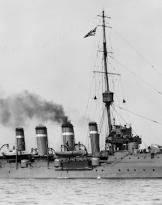After the forcing of Trieste, and the sinking of the battleship Vienna, at the beginning of 1918 it was decided to carry out a new forcing operation, even more daring, to be carried out in the Bay of Buccari, set inside a narrow channel near the main enemy bases.
The 4 February 1918 a seaplane made a reconnaissance on Pula, Rijeka and Buccari, at the end of which reported an important photographic material showing the presence of 4 "Viribus", 3 "Radetzki", 3 "Erzherzog", a " Monarch ", two explorers and various destroyers, of 23 steamers in the port of Fiume and of 4 ships to Buccari.
On the night between 10 and 11 February, a surprise action was taken to destroy the military and merchant ships that were in the Bay of Buccari.

The MAS 94, 95 and 96 under the command of the frigate captain Costanzo Ciano, supported by three naval groups of destroyers and explorers in function of escort, carried out the long route between the two Adriatic coasts, for about 25 miles through canals restricted between the enemy islands, then sailing to arrive at night time to launch against the four merchant ships at anchor, which took place regularly without reaction from the enemy.
The attacking units then resumed their return journey, arriving unharmed at Ancona. The Austrian ships, however, protected by antisylur networks did not report damage.
The poet Gabriele D'Annunzio, aboard the MAS 96 under the command of the lieutenant captain Luigi Rizzo, threw three bottles into the bay containing a mocking message that gave the action the nickname "Beffa di Buccari".
Even if no damage was caused, in fact, the company forced the enemy to engage in the search for new defense and surveillance strategies, and had "an incalculable moral influence".
After Buccari, even, the Austrian Navy Command attempted a direct attack against the MAS at the mooring in Ancona, having found that there were no other possibilities to hit the new weapon decisively. However, this attempt failed and the operation ended with the surrender of the Austrians.













